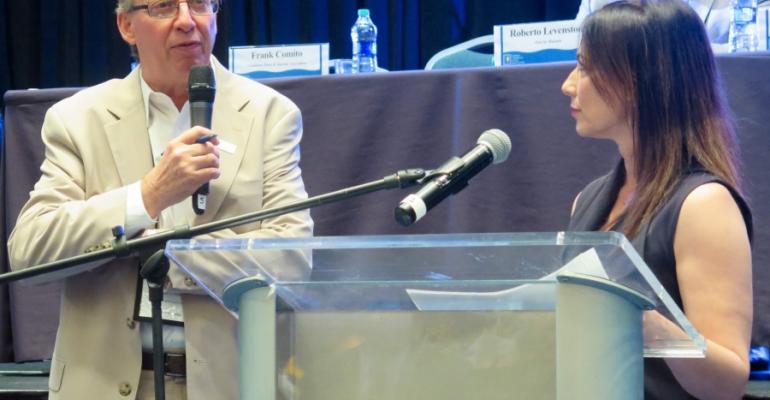First and foremost, preventing loss of life, but also preventing loss of property and adverse publicity that can cause serious reputation damage, severe business impact and overreaction by regulators are all critical reasons to be prepared, said Bud Darr, svp technical and regulatory affairs, Cruise Lines International Association.
Accidents and incidents of all kinds are bound to happen and destinations need to be ready to cope with just about anything—from individual medical emergencies to mass casualties ashore, shipboard fires or navigational accidents, infectious diseases, natural disasters and security incidents on board or in port.
'Prepare, prepare, prepare,' Darr advised a Florida-Caribbean Cruise Association conference workshop on safety and security best practices and crisis management.
Even a 'simple' ship evacuation at berth involves careful planning and complex logistics, said Russell Daya, executive director, global port operations & developments, Disney Cruise Line, and FCCA Operations Committee chairman.
Cruise lines and ports share the responsibility for planning emergency response and must work collaboratively to ensure a good outcome.
Daya said a year of work went into refining the plan for managing a ship evacuation at Disney's terminal in Port Canaveral. The line and the port had to carefully consider how to care for 4,000 people, including many children, who would be standing in the heat with no food or facilities, possibly for hours. Evacuating cruisers to a multi-story garage would provide shade but first the security of the garage must be ensured using bomb-sniffing dogs.
Many Caribbean destinations lack the assets to manage an incident such as the recent evacuation of a ferry due to an engine-room fire off Puerto Rico. The outcome was successful thanks to the US Coast Guard's preparation and presence with its marine and air assets.
If there's an incident on a cruise ship carrying 4,000 passengers and 1,500 crew at an island with a population of only 25,000 people, 'How will you manage? What will you do?' Daya asked.
In one leading Caribbean cruise port—St. Maarten—incidents have included Norwegian Gem being turned away in March because of norovirus on board, a technical failure that kept Carnival Dream alongside for 96 hours in 2013 and the 1998 grounding of Monarch of the Seas.
Robert Levenstone, port safety manager, Port St. Maarten, said whatever the crisis, communication is key. When Norwegian Gem was turned away by health officials because of norovirus—a very common gastrointestinal illness with 700m cases a year worlwide, according to the World Health Organization—'The multidisciplinary approach needed in such an incident was never applied. There was no communication,' Levenstone said.
Levenstone outlined seven steps to create a crisis management plan: conduct a needs assessment, establish a crisis communications team, identify and involve key stakeholders, evaluate communications channels (Twitter and Facebook are key), communicate the plan in advance, gather fact sheets/talking points to provide accurate information and develop assessments/methods of evaulating the response to incorporate lessons learned.
In the case of the ship being turned away for norovirus, lessons learned were applied immediately, Levenstone said. St. Maarten now has a clear plan of action should a cruise ship public health concern arise.
Cruise ship experts on the panel put that incident down to a lack of knowledge about norovirus and the procedures in place to control it. Passengers and crew who develop symptoms are quarantined on board and their cruise cards are flagged so they can't go ashore.
No one is as good at preventing and controlling norovirus as cruise lines are, Darr said, adding that CLIA is involved with some of the leading norovirus researchers and is working with a company that's testing a vaccine.
Rick Murrell, ceo, Tropical Shipping, used the example of Le Boréal's engine fire in a remote area off the Falkland Islands last November as a cautionary tale. He described issues such as a lack of navigational equipment/GPS on the lifeboats so drivers didn't know where to go, and the lifeboats running out of fuel and lacking tow ropes.
Fortunately the Royal Navy had marine and air assets nearby that facilitated a safe evacuation. Hundreds of people were landed at tiny Port Stanley where the residents took them into their homes in a scenario similar to how the community of Gander, Newfoundland, took in people from 38 jets grounded after 9/11 (as chronicled in the book The Day the World Came to Town.)
Stacy Pallot-Shweky, who manages Carnival Cruise Line's Care Team, described how it springs into action after an incident. Supplementing 4,000 shipboard Care Team members, 500 trained shoreside volunteers can be quickly marshaled and dispatched to remote sites within six to eight hours of the initial emergency call. Carnival uses Empathia, which has a global footprint, to support its crisis response.
Pallot-Shweky said the first action is notifying the affected people's emergency contacts. An information hotline is established and a family assistance center is activated in a location such as a hotel ballroom, church or other shoreside facility.
Components of a family assistance center include a family briefing area, spiritual care, first aid, transportation and child care, personal care items like toiletries and clothing, a laptop and phones so people can call home, television for entertainment/information, and travel and lodging service. It's very important the family assistance center be secured, Pallot-Shweky said.
An on-site manager is designated to give Carnival regular, frequent updates, and other officials are in charge of communications support, food and supplies, and ticketing and logistics. A medical liaison and a liasion with authorities are assigned. The line's public relations team is responsible for handling media communications.
Carnival conducts regular Care Team training for destinations, typically on board its ships, and Pallot-Shweky invited FCCA delegates to participate.
'Crisis presents an opportunity if we're prepared. It's about managing the situation before it manages you,' summed up Frank Comito, ceo and director general, Caribbean Hotel & Tourism Association, who moderated the FCCA workshop.
Copyright © 2024. All rights reserved. Seatrade, a trading name of Informa Markets (UK) Limited. Add Seatrade Cruise News to your Google News feed.


